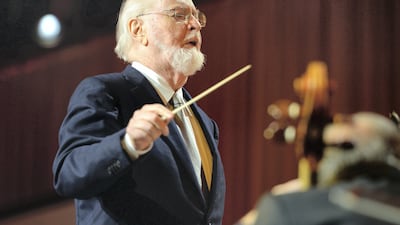Amidst a galaxy of stars at the Academy Awards ceremony on Sunday will be an unassuming and bespectacled Englishman.
While composer John Williams is not known for his media appearances, his work has been heard on the big screen for more than 50 years, as he has soundtracked some of Hollywood’s biggest film franchises from Star Wars and Indiana Jones to the Harry Potter films.
This year’s nomination of Best Original Soundtrack for Indiana Jones and the Dial of Destiny has made him the most nominated living person at the Academy Awards thanks to 54 nominations, including five wins.
While his popular soundtracks will remain etched in our collective memories, it is perhaps Williams's less heralded works that truly reflect his mastery of the craft.
Here are five underrated film scores, in chronological order, composed by the maestro.
1. The Cowboys (1972)
It takes a lot to outshine John Wayne, which Williams did with a sterling soundtrack for what is a lacklustre film.
With folk melodies used to render characters and gorgeous strings to evoke the expansive scenery of the American West, Williams creates a thoroughly engaging score that goes toe-to-toe with Wayne’s character, an ageing cowboy and the rivals on his tail.
2. Seven Years in Tibet (1997)
Williams's first collaboration with Chinese-American cellist Yo-Yo Ma, this score captures the wonder and emptiness of the Himalayan mountain range.
Evocative Tibetan chants are also infused with melancholy string arrangements to complement the main character's spiritual reawakening in the secluded country.
3. Angela’s Ashes (1999)
It is Williams's crucial score that shed some much-needed light in what is a thoroughly bleak, yet affecting film.
In addition to capturing the resilience and tragedy of an Irish family migrating to the US in the 1930s, Williams's emotional score also pays tribute to Ireland’s rich musical history through the use of traditional instruments such as tin whistles and fiddles.
4. AI: Artificial Intelligence (2001)
Williams shows he is on par with Hans Zimmer when it comes to conjuring an ethereal and futuristic atmosphere.
With the plot following the life of David, a child android struggling to come to terms with his programmed emotions, Williams captures his anguish and the existential questions the film poses through ruminative piano motifs and throbbing scores, melding strings with electronic music elements.
5. Memoirs of a Geisha (2005)
One of Williams's most elegant works, he deftly infuses traditional Japanese instruments such as the shakuhachi (bamboo flute) and koto (zither) with a lush symphonic orchestration.
The centrepiece and leitmotif, Sayuri's Theme, is achingly lyrical and guest musician Yo-Yo Ma’s cello evokes the lonely and emotionally transactional world that geishas inhabit and the title character's quest to break free.
Well regarded, Williams's elegiac soundtrack proves there is more to his oeuvre than underscoring exciting action sequences.


